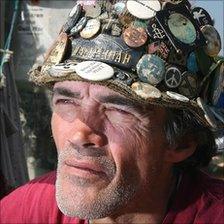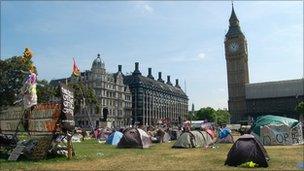Mayor wins case to evict Brian Haw from Parliament camp
- Published

Peace campaigner Brian Haw set up his camp opposite Parliament in 2001
Veteran peace campaigner Brian Haw has lost his case to keep his camp in Parliament Square after the mayor of London won a possession order.
Boris Johnson won High Court possession orders to evict Mr Haw, who set up camp in 2001 in Parliament Square Gardens.
In July the Court of Appeal backed the mayor's bid to remove a so-called "Democracy Village", but Mr Haw's camp was not included in that ruling.
Mr Justice Wyn Williams said "making of orders in this case is proportionate".
The Parliament Square Gardens is owned by the Greater London Authority (GLA), while the pavement surrounding the square belongs to Westminster Council.
The judge granted an order for possession and an injunction against Mr Haw, from Redditch, Worcestershire, and fellow protester Barbara Tucker.
The campaigner has been given until 28 March to apply for permission to appeal against the decision.
Until then the orders will not be put into force, the court said.
Fences adjusted
Mr Haw is currently undergoing treatment for lung cancer in Germany. Ms Tucker, who was in court on their behalf, said she would appeal against the decision.
Giving his ruling, Mr Justice Williams said: "As is apparent from this judgment, I have concluded that the claimant has adduced substantial evidence which justifies the conclusion that the making of orders in this case is proportionate."
Mr Haw's and Ms Tucker's protest interfered with the rights of others, justifying the decision, he said.

Protesters who camped in "Democracy Village" were evicted in July
Earlier the court had heard that Mr Haw's protest was within the scope of Article 10 and 11 of the Human Rights Act, which deals with freedom of expression, association and assembly.
The judge said: "Parliament Square Gardens is not a suitable location for prolonged camping; such camping is incompatible with the function, lawful use and character of PSG and it is also inconsistent with the proper management of the area as a whole."
He added that the campaigners' tents and placards were occupying more space than was permitted.
The pair would be allowed use of a three-metre length of kerb to display placards as that had been a part of the protest for several years, the judge said.
Reclaiming the square
A spokesman for the mayor said: "The Court of Appeal had previously made a special case for Brian Haw and Barbara Tucker that they could continue to sleep on the grass area controlled by the GLA on a temporary basis while their case was referred back to the High Court for conclusion in this matter.
"The High Court has now concluded that neither party should be allowed to continue to sleep on the GLA-controlled grass. The perimeter fences will be adjusted accordingly."
Westminster Council, which owns the pavement, had also launched legal action against protesters who occupied the footpath after being evicted from the green last July, the court heard.
Irrespective of the outcome of that trial the mayor could apply for an order in relation to the kerb, Mr Justice Wyn Williams said.
Last July, bailiffs and police evicted demonstrators who set up the "Democracy Village" in May 2010 after the mayor was granted a possession order for the site, citing vandalism.
The leader of Westminster Council, Councillor Colin Barrow, said the decision on Mr Haw's camp was "the first step in reclaiming the square for all".
- Published28 February 2011
- Published17 January 2011
- Published3 June 2010